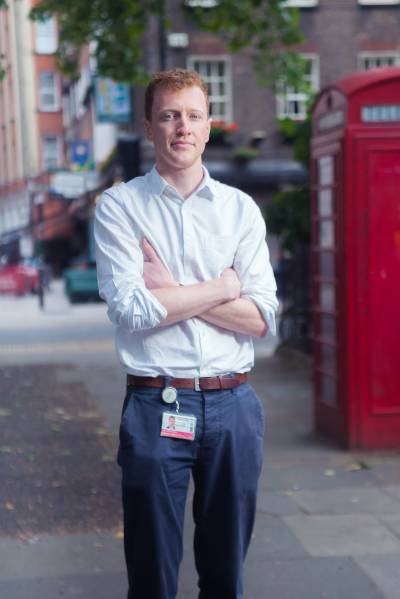Spirit of SLMS Winner (Scientific Excellence & Leadership)
Chris completed his PhD in Neurodegenerative Diseases at the UCL Dementia Research Centre in 2017, under the supervision of Professors Jason Warren and Seb Crutch, funded by an MRC PhD Studentship in Mental Health.
Tell us a bit about your research achievements.
In my PhD I defined mechanisms of auditory signal decoding in the major primary progressive aphasia (PPA) syndromes. I chose audition as a model system that allowed me to move beyond the traditional emphasis on language neuropsychology in PPA, to consider more fundamental mechanisms of disordered neural information processing that might underpin these disorders.
I have first-author publications arising directly from my PhD work in Alzheimer’s Research and Therapy; Neurobiology of Aging; Annals of Clinical and Translational Neurology; the Journal of Alzheimer’s Disease, and the Journal of Neurology (x2). I feel my work has advanced understanding of the pathophysiology and clinical assessment of hearing function in these devastating diseases. The PPAs have been defined since their discovery at the end of the nineteenth century as ‘language-led’ disorders. My research suggests that a reconceptualization of PPA – as more fundamental disorders of auditory signal decoding – may be warranted.
Ultimately, I believe this work is leading to the identification of new biomarkers that will allow us to detect and track brain dysfunction in PPA (and potentially, the impact of new treatments) more sensitively and reliably than is currently possible.
What have been some of the great milestones and/or achievements for you during your time at UCL?
I came to UCL in 2012 to do an MSc in Cognitive Neuroscience and have never really looked back.
My PhD years at the UCL Dementia Research Centre were the most intensely rewarding of my life: I love working with the patients I see with primary progressive aphasia (PPA) and Alzheimer’s disease (AD); I love conducting research that has clinical and translational relevance for these patients; and I love being in a research environment that encourages and supports the kind of science that I am passionate about.
Submitting my thesis was a huge personal milestone - I had made a Facebook event three years earlier and invited all my friends to come and celebrate with me on a specific date. When I finally handed in on that date it was a brilliant feeling.
What role do you think public engagement of science plays in wider society?
I think public engagement is absolutely crucial. The terms ‘dementia’ and ‘Alzheimer’s disease’ are often treated as synonymous in the press – but dementia is an umbrella term encompassing over a hundred unique syndromes. It is really critical that as scientists we help to share this message.
I’m really privileged to work with the primary progressive aphasia (PPA) Support Group run by the Dementia Research Centre at UCL – and probably the most important and most valuable thing that I do is talking to people with or affected by PPA at our meetings.
Top 3 places/things to do in London?
- Hampstead Heath is incredible – and has open swimming ponds during the summer months
- Richmond Park – my favourite place to go cycling and full of deer
- Katzenjammers – Bavarian beer hall near London Bridge with a live brass band
What would surprise people about you?
I am a triathlete and really enjoy swimming, cycling and running. During the second year of my PhD I trained for a long-distance ‘Ironman’ triathlon, comprising a 2.4 mile swim, 112 mile bike ride, and 26.2 mile marathon. It took me more than 13 hours, but I managed to raise over £3,000 for Rare Dementia Support – and, now that the pain has (mostly) subsided, I think it was totally worth it.
 Close
Close


